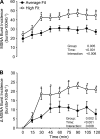Influence of endurance training on central sympathetic outflow to skeletal muscle in response to a mixed meal
- PMID: 20110544
- PMCID: PMC2853201
- DOI: 10.1152/japplphysiol.01174.2009
Influence of endurance training on central sympathetic outflow to skeletal muscle in response to a mixed meal
Abstract
Nutrient intake is accompanied by increases in central sympathetic outflow, a response that has been mainly attributed to insulin. Insulin-mediated sympathoexcitation appears to be blunted in insulin-resistant conditions, suggesting that aside from peripheral insulin insensitivity, such conditions may also impair the central action of insulin in mediating sympathetic activation. What remains unclear is whether an insulin-sensitive state, such as that induced by chronic endurance training, alters the central sympathetic effects of insulin during postprandial conditions. To examine this question plasma insulin and glucose, muscle sympathetic nerve activity (MSNA), heart rate, and arterial blood pressure were measured in 11 high-fit [HF; peak oxygen uptake (V(O(2peak))) 65.9 +/- 1.4 ml x kg(-1) x min(-1)] and 9 average-fit (AF; V(O(2peak)) 43.6 +/- 1.3 ml x kg(-1) x min(-1)) male subjects before and for 120 min after ingestion of a mixed meal drink. As expected, the insulin response to meal ingestion was lower in HF than AF participants (insulin area under the curve(0-120): 2,314 +/- 171 vs. 4,028 +/- 460 microIU x ml(-1) x 120(-1), HF vs. AF, P < 0.05), with similar plasma glucose responses between groups. Importantly, following consumption of the meal, the HF subjects demonstrated a greater rise in MSNA compared with the AF subjects (e.g., 120 min: Delta21 +/- 1 vs. 8 +/- 3 bursts/100 heart beats, HF vs. AF, P < 0.05). Furthermore, when expressed relative to plasma insulin, HF subjects exhibited a greater change in MSNA for any given change in insulin. Arterial blood pressure responses following meal intake were similar between groups. Collectively, these data suggest that, in addition to improved peripheral insulin sensitivity, endurance training may enhance the central sympathetic effect of insulin to increase MSNA following consumption of a mixed meal.
Figures




References
-
- ACSM ACSM's Guidelines for Exercise Testing and Prescription (6th ed.) Philadelphia, PA: Lippincott Williams and Williams, 2000
-
- Acheson KJ. Influence of autonomic nervous system on nutrient-induced thermogenesis in humans. Nutrition 9: 373–380, 1993 - PubMed
-
- Berger M, Kemmer FW, Becker K, Herberg L, Schwenen M, Gjinavci A, Berchtold P. Effect of physical training on glucose tolerance and on glucose metabolism of skeletal muscle in anaesthetized normal rats. Diabetologia 16: 179–184, 1979. - PubMed
-
- Berne C, Fagius J. Metabolic regulation of sympathetic nervous system activity: lessons from intraneural nerve recordings. Int J Obes Relat Metab Disord 17, Suppl 3: S2–S6; discussion S22, 1993 - PubMed
Publication types
MeSH terms
Substances
Grants and funding
LinkOut - more resources
Full Text Sources
Medical
Research Materials
Miscellaneous

